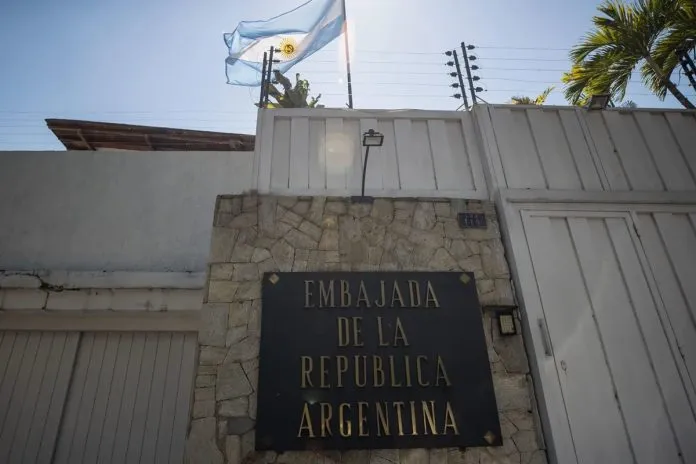Introduction
In a dramatic escalation of diplomatic tensions between Argentina and Venezuela, Argentine diplomats are set to leave Venezuela this Thursday. This development follows a recent announcement from the Venezuelan government, led by President Nicolás Maduro, which expelled the Argentine diplomatic staff due to disagreements over the recent elections. The situation remains fluid, with significant concerns regarding the safety of Venezuelan political asylum seekers and the broader implications for international diplomacy. This article provides a comprehensive overview of the circumstances surrounding this diplomatic row, the challenges faced by the involved parties, and the potential impacts on regional and global diplomatic relations.
Background on the Diplomatic Crisis
The Diplomatic Expulsion
On Monday, the Venezuelan government declared the expulsion of Argentine diplomats in response to Argentina’s stance on the recent presidential elections. This decision has forced the diplomatic staff to prepare for their departure, which is scheduled for this Thursday. The diplomats will leave Venezuela via Europe, with the final leg of their journey taking them from Madrid to Buenos Aires on Saturday. This development marks a significant deterioration in the diplomatic relations between the two nations.
The Venezuelan Elections Controversy
The expulsion of the Argentine diplomats is rooted in the controversy surrounding Venezuela’s recent elections, held on July 28. According to the official results released by the National Electoral Council (CNE), President Nicolás Maduro was reelected. However, these results have been met with widespread skepticism and accusations of electoral fraud. The Argentine government has been vocal in its criticism, alleging that the electoral process was marred by irregularities and fraud.
Diplomatic Tensions and Responses
The diplomatic spat between Argentina and Venezuela is part of a broader pattern of escalating tensions involving multiple countries. In response to Argentina’s stance, President Maduro has demanded that not only Argentina but also Chile, Costa Rica, Peru, Panama, the Dominican Republic, and Uruguay withdraw their diplomatic representatives from Venezuela. This demand reflects the Venezuelan government’s growing frustration with international scrutiny and criticism of its electoral process.
The Situation at the Argentine Embassy
Security and Asylum Issues
The Argentine Embassy in Caracas has been at the center of this diplomatic crisis. According to reports, Venezuelan security forces have besieged the embassy, restricting access to basic supplies and support. This situation has created a dire humanitarian concern, particularly for the six Venezuelan opposition figures who have sought asylum within the embassy since March. The Venezuelan government’s insistence on the closure of the embassy and the handover of these asylum seekers has exacerbated the tension.
Efforts by the Argentine Government
In response to the escalating situation, the Argentine government has sought international intervention to protect its diplomatic staff and ensure the safety of the asylum seekers. The Argentine Ministry of Foreign Affairs has been actively involved in diplomatic negotiations and has raised the issue with international organizations. The country’s Foreign Minister, Diana Mondino, has traveled to Washington, D.C., to participate in an emergency meeting convened by the Organization of American States (OAS). This meeting aims to address the broader implications of the crisis and to seek solutions to protect diplomatic personnel and asylum seekers.
International Reactions and Implications
The Role of International Organizations
International organizations have played a crucial role in responding to the diplomatic crisis. The OAS, in particular, has been instrumental in facilitating discussions and seeking resolutions to the conflict. The involvement of international bodies underscores the significance of the situation and the need for a coordinated response to address the diplomatic and humanitarian issues at stake.
Impact on Regional Diplomacy
The departure of Argentine diplomats and the broader diplomatic tensions have significant implications for regional diplomacy. The situation highlights the challenges faced by countries in navigating complex international relations and addressing conflicts arising from domestic political disputes. The crisis also underscores the importance of effective diplomatic channels and international cooperation in resolving such issues.
The Future of Diplomatic Relations
Prospects for Resolution
As the Argentine diplomats prepare to leave Venezuela, the prospects for resolving the diplomatic crisis remain uncertain. The ongoing tensions and the broader political context suggest that finding a resolution will require sustained diplomatic efforts and international engagement. The situation will likely continue to evolve, with potential impacts on regional stability and international relations.
Long-Term Implications
The diplomatic fallout between Argentina and Venezuela may have long-term implications for their bilateral relationship and for broader international diplomacy. The crisis underscores the challenges faced by countries in managing diplomatic relations amid political controversies and domestic unrest. It also highlights the need for robust diplomatic frameworks and international mechanisms to address and resolve conflicts effectively.
Conclusion
The departure of Argentine diplomats from Venezuela marks a significant escalation in the diplomatic crisis between the two countries. The situation, rooted in controversy over the recent Venezuelan elections and exacerbated by the siege of the Argentine Embassy, raises serious concerns about the safety of asylum seekers and the broader implications for international diplomacy. As the crisis unfolds, the international community’s response and the efforts of diplomatic agencies will be crucial in addressing the challenges and seeking a resolution to the ongoing tensions.
For continued updates and in-depth analysis of Latin American affairs, please visit our Latin America section.


